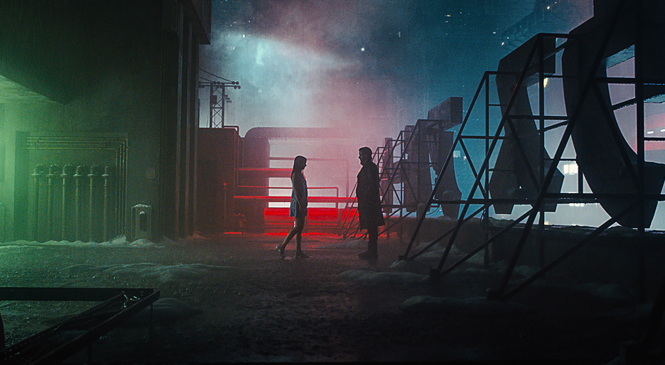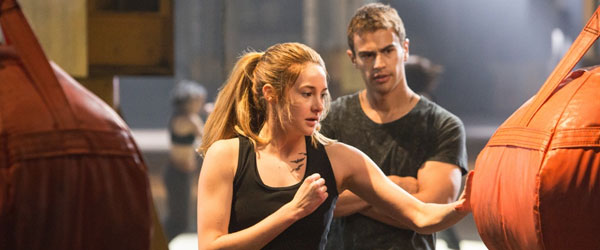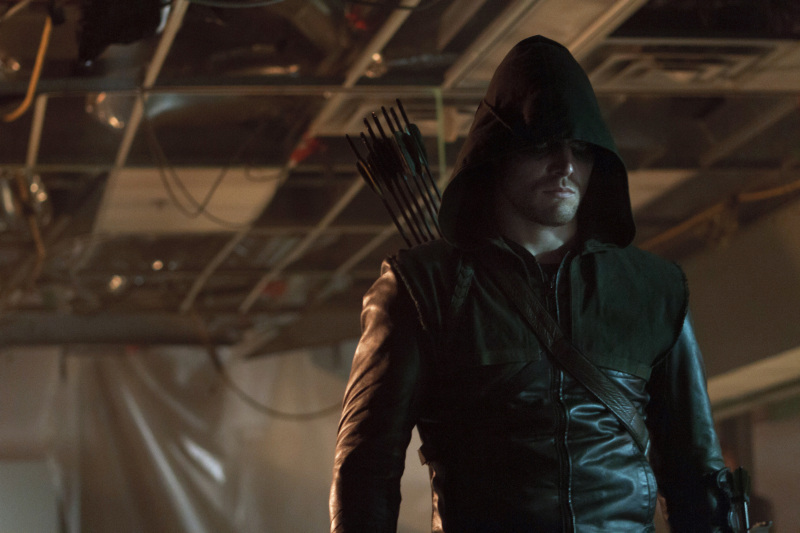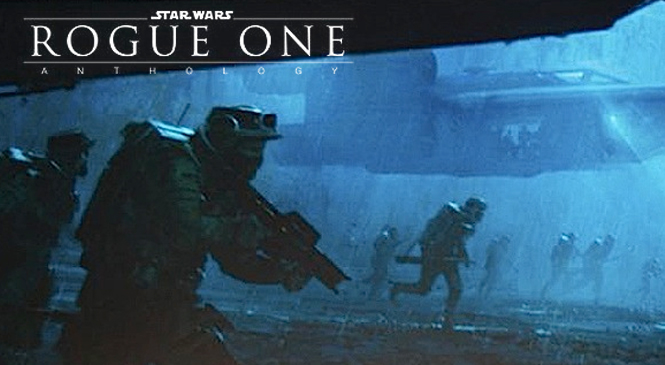BLADE RUNNER 2049 Expands on the Original

 Blade Runner 2049 (2017)
Blade Runner 2049 (2017)
Written by Hampton Francher and Michael Green
Directed by Dennis Villenueve
Produced by Ridley Scott
Based on Phillip K. Dick’s Do Androids Dream of Electric Sheep
This review is full of spoilers. Don’t read it unless you’ve seen the movie. If you haven’t seen it, go see it. It’s brilliant, beautiful and boldly thought-provoking. It has a lot of respect for the first film. I have only two real complaints. In the theater where I saw it, the sound was turned up so loud that some parts of the soundtrack were physically painful. The “robot tinnitus”, as we dubbed it, that happened every time the main character was upset, really hurt the ears.
Also, the title is lame.

Like the first movie, Blade Runner 2049 raises questions about what it means to be human and what it means to love someone. It also has some of the same quality of film noir about it but is far more post-apocalyptic than it is dystopian. We have graduated from an overcrowded world where there is little that is alive and not artificial, one in which corporations rule, to one in which every resource on earth has been sucked dry and everyone is leaving for other planets. We have trashed the earth and must move on to the next pristine planet to destroy.
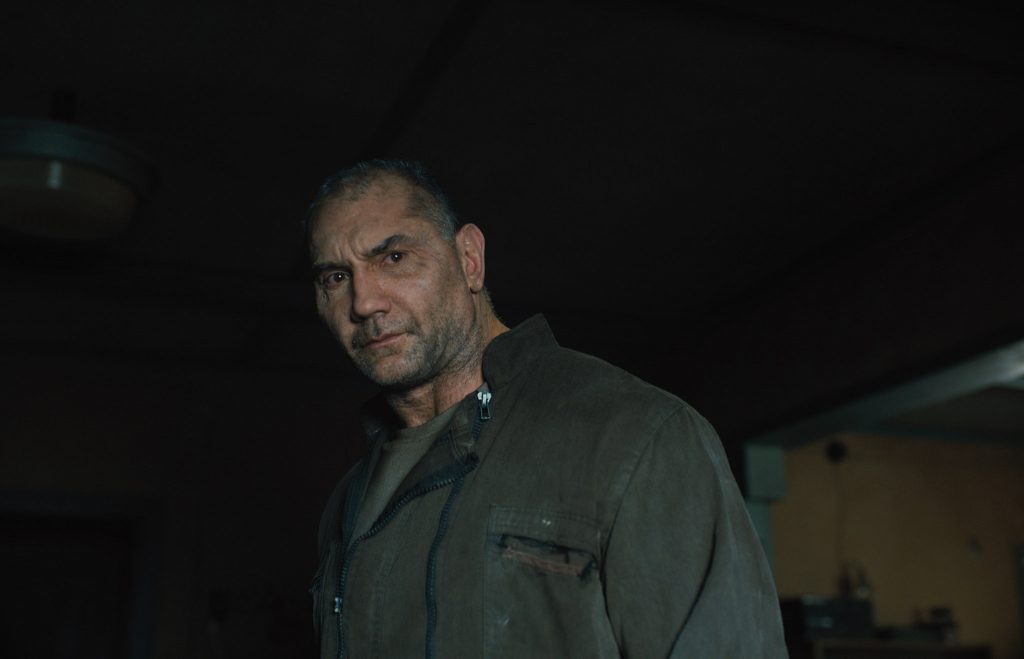
This time around we know that our blade runner, played by Ryan Gosling, is a replicant from the start. K, who has only a number and letter designation, doesn’t consider himself as hunting his own kind, because he is a newer, more compliant model of replicant. He has no trouble killing a replicant that isn’t bothering anyone. Sapper Morton (Dave Bautista) lives in isolation on his protein farm. We also find out that the blade runner isn’t treated equally to humans. It’s interesting that he uses his bonus to buy freedom for his AI girlfriend (Ana De Armas).
When K discovers a box under the old dead tree, I was relieved that the farmer was a serial killer after all. Of course that turns out not to be the case and the bones are of a replicant, Rachael (Sean Young), who died in childbirth and never got to find out how long her lifespan was supposed to be.
This sends our hero off to find the child that was born of replicant or replicants. He comes to believe, egged on by his holographic girlfriend, that he is that child. He has a memory of a carved wooden horse that has the same date on it that’s carved in the tree over Rachael’s grave.
The villain of the movie finds out about the remains almost as soon as Agent K does. Niander Wallace (Jared Leto) is an interesting villain. He saved the human race with his bio-engineered food. He is now saving people by enabling them to colonize other planets with replicant labor. But make no mistake-he is still the bad guy. He starts out espousing the virtues of slavery and kills a replicant because she didn’t turn out the way he wanted. His desires are carried out by Luv (Sylvia Hoeks). Luv is a replicant who would be a total psychopath if it weren’t for the tear that falls down her cheek, ignored by her, when she kills someone.
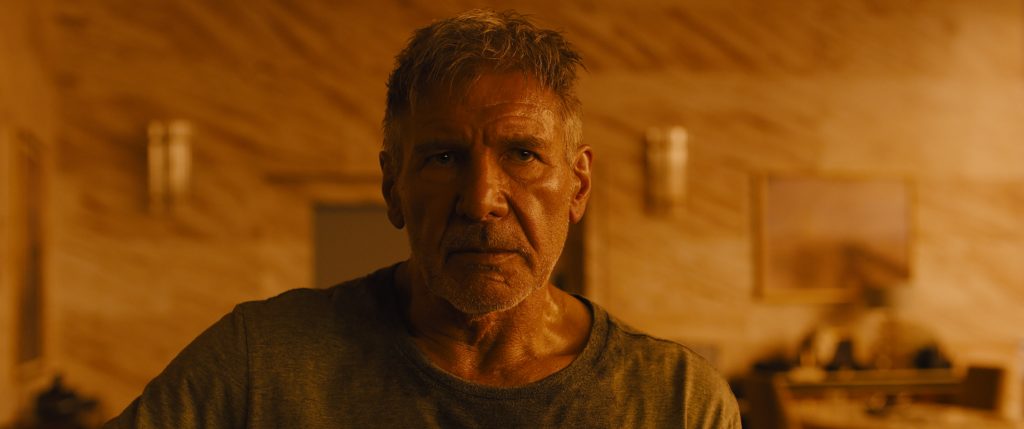
K, dubbed Joe by his girlfriend, hunts down Deckard and finally Harrison Ford comes into the movie. He’s been hiding in Las Vegas, which is a radioactive ruin. He is Harrison Ford at his best — Deckard as an old, lost man who has given up a life with his child to protect it. A particularly funny line is when Joe asks Deckard if his dog is real. He suggests that he asks the dog. Ridley Scott has said that Deckard is a replicant. Harrison Ford insists that he is not. That throwaway line implies that the character should be able to say whether they are real or not. On the other hand, it’s a dog. If it could talk it would have no doubts about whether it’s real or not.
Luv follows Joe and Deckard is captured. Joe is left for dead as no one cares about him anymore. The replicant resistance finds him, and he finds out that he is not the child. It’s a girl, and all the replicants wanted to be the one. They want him to kill Deckard to protect the miracle baby. His girlfriend was “killed” in the fight, and he comes across a giant holographic ad for her. I have seen this interpreted as a romantic scene, showing how much he misses her, but I think it’s the final disillusionment. Even the name she gave him is part of the advertising.
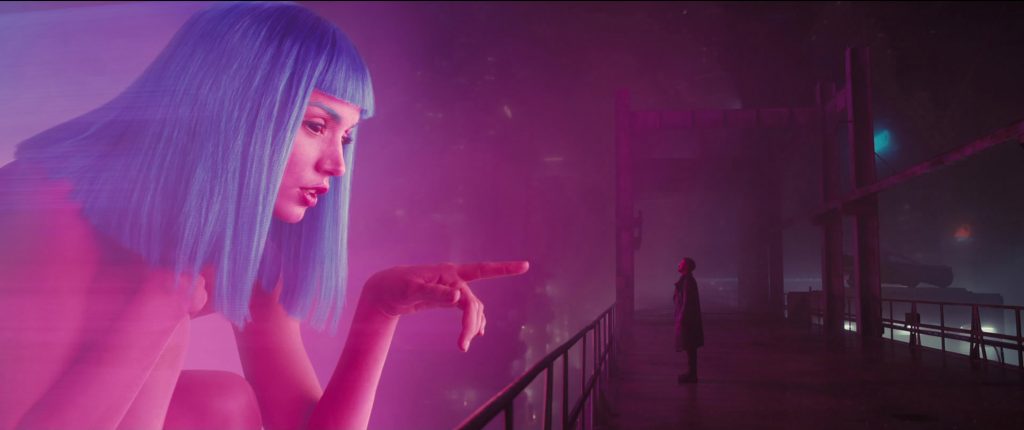
Wallace offers Deckard his lost love in the form of a replication of the replicant Rachael. Deckard turns him down, saying her eyes are the wrong color. Unfortunately this gets the new Rachael killed immediately. This is not the same as Wallace killing the newly born replicant earlier. Deckard knows that love is a singular event that happens with a unique person. He accepts no substitutes.
Despite finding out that he is not the miracle child, Joe decides to rescue Deckard and take him to his daughter. He knows who it is because he shares that rogue memory with her. Having completed his mission, he lies on the steps to die of his wounds. He was never the messianic figure. He was never Jesus, but John the Baptist all along.
The argument is made even more clearly in this movie that replicants are real and deserving of equal rights with humans. It’s wrong to create another race to use them as slaves. For that matter, it’s wrong to have an artificial intelligence that is programmed to serve and live only for its owner and have such a restricted space and life, especially if she really is self-aware. It’s like having a genie trapped in a bottle.
It’s difficult to tell if Joi has any existence outside of serving K (Joe). She tells Joe that she knew all along that he was different, special, a real boy. Is she saying that because it is his deepest wish, which he hasn’t even admitted to himself yet? Or is she saying that because it is her own deepest wish? A real girl might not have said those things. She might have warned against getting his hopes up so they wouldn’t be dashed later. She would certainly have said it didn’t matter and she loved him just the way he was.
Joe deviates more from his programming and acts on his own accord as he comes to believe that he was born and not made. In the end he realizes that he is the protagonist of his own story regardless of his origin. He should not romanticize being born, however. It looked to me like replicants have more than enough trauma at their births to make them real.
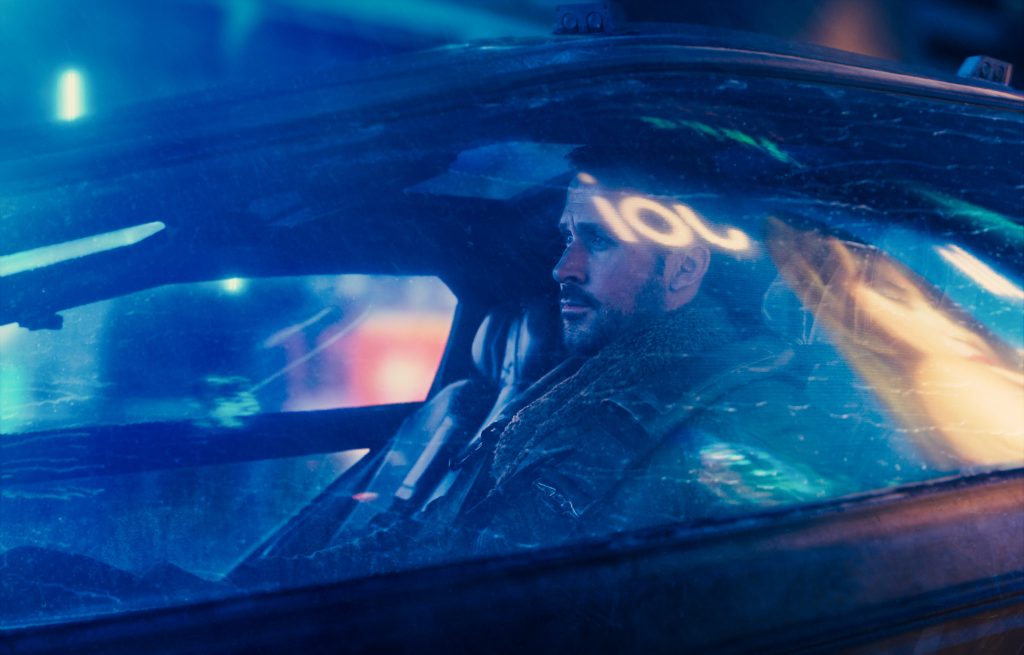
There are many themes in this movie that could be explored, but I want to touch on the misogyny and sexism that many saw in the movie. Even though I haven’t seen so many nipples since Batman Forever, I didn’t walk out of the theater thinking about how sexist it was. I walked out thinking about how it revealed some of the darker thoughts and actions of men, as well as mankind. Blade Runner 2049 could certainly be called misanthropic. Humans have destroyed their planet. They are practicing slavery, child labor, and uncontrolled capitalism. There is a lot of doubt as to whether we should be saved from ourselves and sent to other planets to consume everything in sight. But this movie is all about the male characters, and there’s nothing wrong with that because sometimes that’s what the story is. The men don’t always come off well in dealing with the female characters.
K (Joe) appears to care about his virtual girlfriend. He wants to broaden her world. He doesn’t want to lose her when they are forced to wipe her information when he flees his apartment. He is faithful to her and turns down offers from other women, even though they can’t have sex. (There is something ironic about the replicant sneering at him for not liking “real girls”.) He accepts the weird and uncomfortable menage a trois with the replicant prostitute because Joi initiates it. I think it’s very suspect that she initiates it because she may only be a mirror of his desires and have no will of her own. He doesn’t ever seem to think about the fact that she is a slave to him in the way that he is a slave to humans and his job.
Wallace stabs a newly made replicant in the womb because he is so frustrated that he can’t impregnate her. This does not mean that women’s only value is in reproduction. It doesn’t reflect on her at all. It reflects on him. He is evil, and at once shows how little value he holds for replicant life (and they must be expensive to produce) and how much he feels he owns them. It shows that he thinks women are only good for reproduction. It doesn’t show that women are only good for reproduction. Now, if the protagonist were stabbing women in the uterus because he couldn’t knock them up and it was stated that that was the right thing to do, it would be a misogynistic movie.
Wallace, by the way, must think that conquest of the universe and amassing a replicant army are more important than his bottom line. If replicants could breed on their own, he would lose the means of production. It’s possible that Wallace, who saved the human race, is also dooming it by providing our replacements.
There is a lot of nudity in the movie, both male and female. There is full frontal male nudity, which is more unusual than the female nudity. The difference is that the male nudity is not in scenes that are meant to sell anything and the men are not young and beautiful. Once again, it’s a highly consumer driven society that has caused the use of all resources on the planet. Sex sells.
Finally, there’s a complaint that the female characters are either not real, dead, or literally under glass. This is true of the male characters as well. Our protagonist is a replicant, Deckard may or may not be one, and the one character that we think is human, our villain, is cybernetically enhanced. There are replicants in bottles, Deckard is hiding in the ruins behind a wall of radiation. Even Gaff (Edward James Olmos) is in a nursing home.
What worries me more are little things. What about the dog? He got left behind. Who’s taking care of the bees? My beekeeper friends tell me they require a lot of maintenance. Their presence means that there are flowers somewhere, unless Deckard was just pouring whiskey on the floor for them. Did Deckard really not have any contact with the resistance all this time?
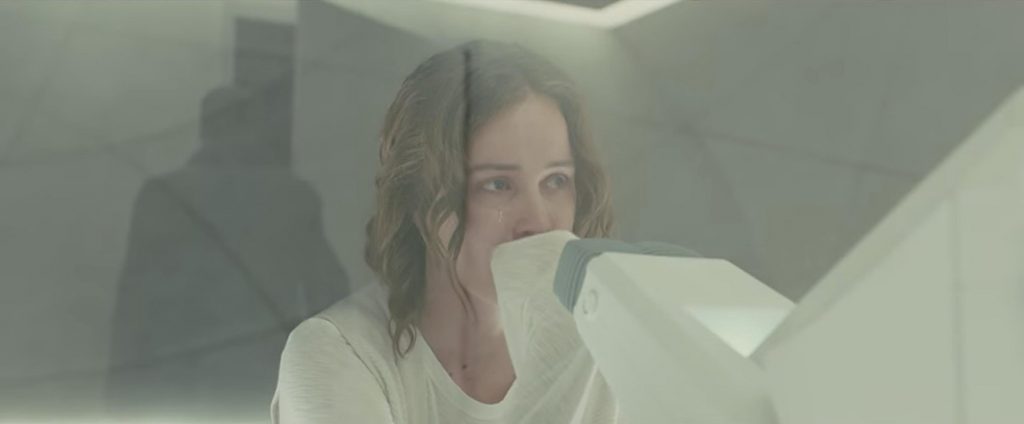
Did Deckard and Rachael’s daughter, Dr. Stelline (Carla Juri), implant her own memory in Joe on purpose? Or was it an accident? It being a powerful memory from her childhood, did all of the replicants she made memories for receive it and Joe was the only one whose memory was jogged by the date? Does she have any idea who or what she is?
Was Rachael made to be as human as possible so she could breed? It’s implied. But if that’s the case, why make her pelvis too narrow? That’s sexism, valuing looks over practicality. It doesn’t make a lot of sense that they produce replicants that can’t reproduce. They must be making the DNA, the chromosomes, too dissimilar from humans and from each other for recombination to occur.
Part of the main conflict in Mary Shelley’s Frankenstein was that the monster wanted a mate. His creator wouldn’t do it because he didn’t want to make a race of monsters. Smart, because we are too small and weak to survive the monsters. But being a child of her times, it never occurred to her that the bride for the monster could just have parts left out. And it also didn’t occur to anyone that they would probably produce a normal child because they were pieced together from parts of normal people. It could be that the real problem with replicants is that they would give birth to less than enhanced humans.
Although the movie stands on its own, it also looks like the middle of a three part story. We have just found the miracle child and been introduced to the replicant resistance. The villain is nowhere close to having a comeuppance. Joe could survive. The friend I was with insisted he was only resting on the steps. I would love to see a third film, but I don’t know if that is anywhere close to being a possibility with the disappointing box office. So if you liked it, go see it again!
![]()

